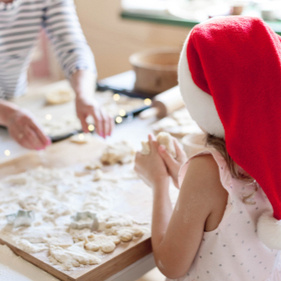Q&A - Divorce and the Holidays: Keeping Spirits Bright

What makes the holidays especially challenging for divorced families?
Coates: Holiday time is about family time, and for people who are divorced, the holidays are a reminder of happier times and of what things used to be like. That sense of loss can develop into anger, particularly when the focus gets away from the children. It’s hard because traditions may have changed. Parents may not be with their children at the same time or spend time with their children during a holiday period based upon the terms of a court order or an Agreement. Christmas or Chanukah for example, may have to be a shared celebration.
Lastra: In divorce, you often dwell on the past. You may not have something you think you deserve. You may see other families as happy. You may still be angry at you ex-spouse and may want to withhold the amount of time your ex has with the children to settle a score. Remember how the Grinch’s heart grew two sizes too small? If you’re bitter and divorced, you can easily become the Grinch at the holidays.
What is the biggest mistake divorced families make during the holidays?
Coates: I can’t tell you how many times I’ve been in court on the Friday eve before a major holiday trying to work out the holiday visitation schedule. You don’t want the courts to plan your holidays or a judge to decide who is going to see your children the next day. One of the biggest mistakes I see is divorced couples waiting too long to make their plans and also waiting too long to look at their custody agreements.
Lastra: There are over 4 million divorced parents in the United States, and for many of them, the holidays get split down the middle. They can’t both have Christmas Day morning with the children. You want to look at your child custody agreement. Is it your year for Christmas Day? Is your transition time noon or 6 pm? Is there an agreement on who is going to deliver the children? Have you changed your arrangement because you’ve been getting along, and now something’s changed and you need to return to what the order states? Make sure you know what the orders and agreements say. I remind my clients that the more they bicker with their ex, the rougher it is on their children. And depending on the circumstances the rougher it may be for them as parents if they find themselves in court; especially if they misbehave.
What is the best way to transition your children to the other parent during the holidays?
Coates: A mistake I see families make is not thinking enough about where and how the children will transition from one parent to the other. Parents often wait too long to identify potential problems. In some communities, families choose to transfer children from one parent to another in the parking of a police station. If possible, I recommend doing that in a more fun public place, like a McDonald’s where children can get a Happy Meal and play on the playground, or at school or camp.
Lastra: Try to put your children first, especially during the holidays. Is this an arrangement that you would want imposed on you? Is it appropriate for your children? Mark it out and include back-up arrangements. Everyone should know what's going on to avoid last minute changes or mix-ups that create more stress and chaos.
How can divorced families start new traditions?
Coates: What are the holidays about? The holidays are about giving, and the best gift for yourself and your children, is giving the gift of time. See if you can offer more time to your ex-spouse to be with the children, especially if that is not the primary custodial parent. See if you can create new routines and do things that aren’t necessarily tied to money. Again, always keep in mind what would be in the best interest of the children.
Lastra: There is only one you, as a person and as a parent. I encourage my clients to think about what is unique to you in your relationship to your kids, that the other parent doesn’t do or have. Is it a cookie recipe that this year you can bake together with your children? Can you take your children to a homeless shelter to serve a meal? Can you go on a hike or walk along the Potomac together? You will be surprised how much a judge will appreciate the parent that's taking the higher road, being more reasonable, and showing more of the holiday spirit, and you’ll be building new memories and traditions with your children.


